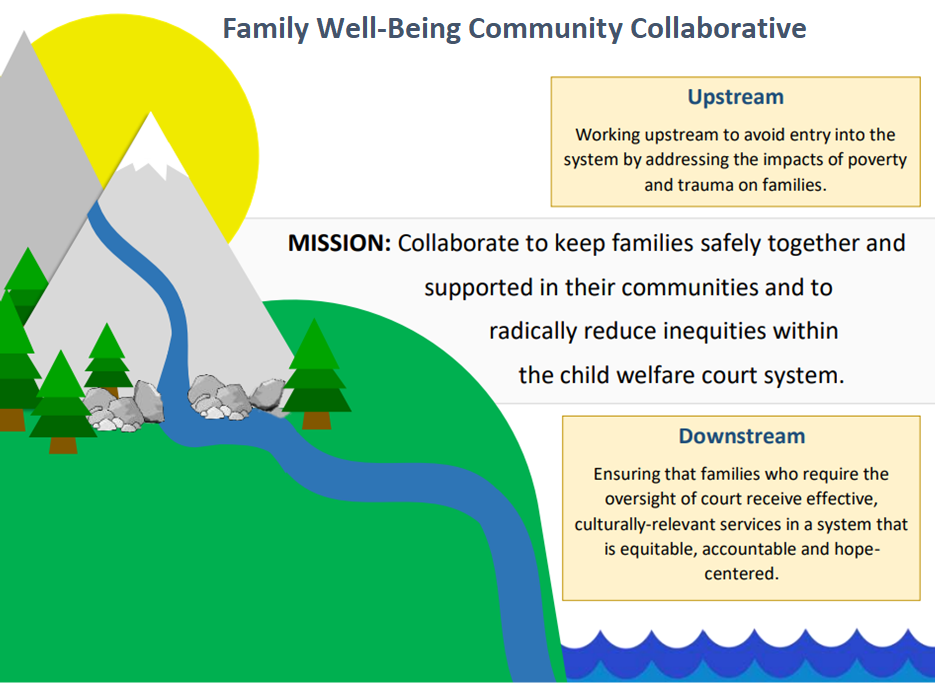
Family Well-Being Community Collaborative
Together we can chart a course for developing a new landscape of how children and families enter and move through the dependency system.

In order to ensure healthy and safe families, we must engage communities, strengthen community-based resources, address the systemic barriers that keep families from thriving, and ensure effective collaboration between the community, the child welfare system, and the court. By doing this we can transform the child dependency system to go beyond a passive role of responding to behavior, to a proactive one that also prevents future harm and preserves wellness in families from all walks of life. This bold new action plan includes working upstream to avoid entry into the system by addressing the impacts of poverty and trauma on families. For those children and families who require the structure and oversight of the court, this ensures that they receive effective and culturally relevant services in a system that is equitable, accountable and hope-centered.
Current Workgroups
Harm of Removal Workgroup
Develop resources and training that supports court communities in assessing and responding to the harm of removal in child dependency cases.
Facilitator: Laura Vogel
Engaging Parents at Shelter Care Workgroup
Identify ways our system can increase engagement of parents at the Shelter Care Hearing and explore recommendations for improvement of systems.
Facilitator: Sarah Burns
Guardianship Workgroup
Identify current system challenges and develop practical tools that enhance the understanding and ability of dependency court communities to utilize Title 13 and Title 11 guardianships in ways that promote positive outcomes for families.
Facilitator: Geene Delaplane, DCYF
Child & Youth Trafficking Workgroup
Identify anticipated impacts of SB 6006 (effective July 1, 2025) on dependency courts and inform the development of resources and training for courts that supports successful implementation.
Meets second Thursday of every month
Facilitator: Laura Vogel
In-Home with Conditions Workgroup
Anticipated Start: Fall 2025
Develop a general court system process and procedure for processing and monitoring in-home with conditions dependency petition filings
Facilitators: Tarassa Froberg & Laura Vogel
Previous Workgroups
Ex Parte Removal Workgroup
Operationalize HB 1227 to the law governing when and how the Department of Children Youth and Families (DCYF) can acquire an ex parte pick-up order.
Facilitator: Sarah Burns
Family Time Workgroup
Assess how aspects of HB 1194 are being implemented, including provision of initial visits and changes to supervision levels and work to develop projects to improve the quality of Family Time visitation.
Facilitator: Jenn Nguyen
Meaningful Shelter Care Workgroup
Create guidance that provides local dependency court partners the tools to collaboratively craft fair and predictable shelter care processes.
Facilitator: Sarah Burns
Data & Evaluation Workgroup
Develop a plan for collecting, monitoring and evaluating the impacts of HB 1227 statutory changes on local court system practice and state-level outcomes for children and families.
Facilitator: Dr. Arina Gertseva




